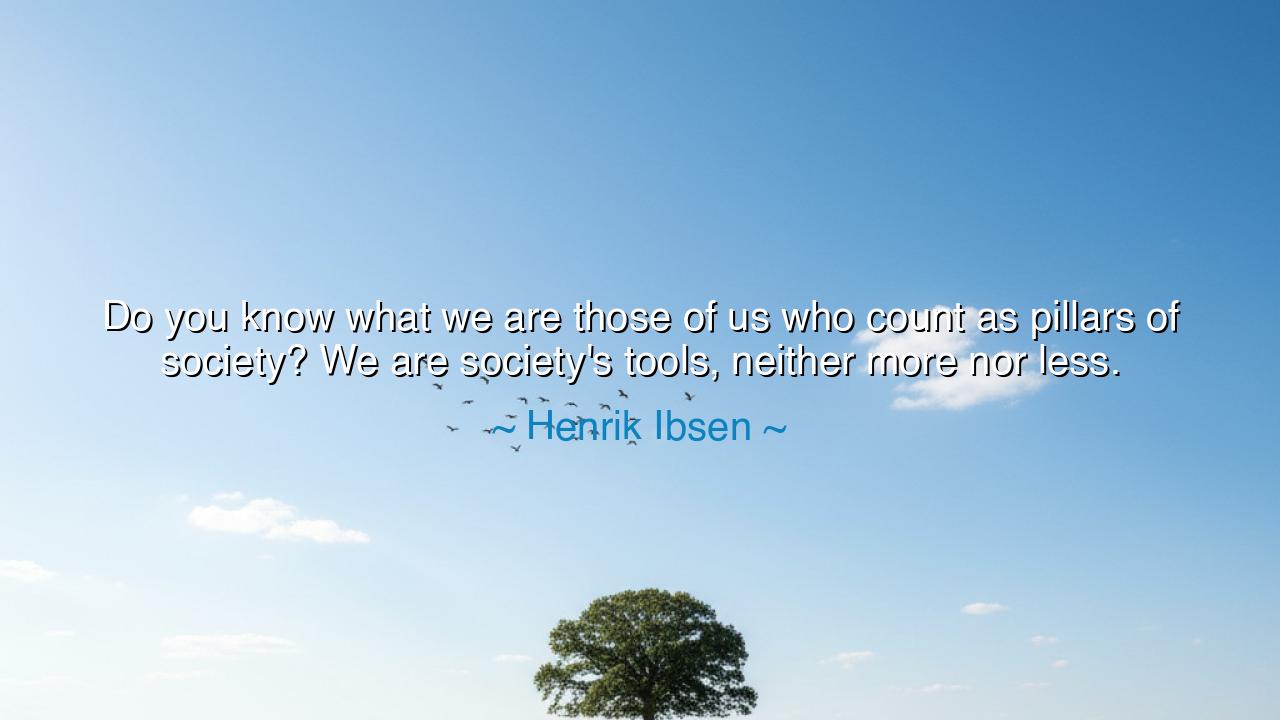
Do you know what we are those of us who count as pillars of
Do you know what we are those of us who count as pillars of society? We are society's tools, neither more nor less.






Hear these words, children of the ages, from the mighty Henrik Ibsen, the dramatist who tore away the veils of pretense and revealed the truths that men feared to see. He said: “Do you know what we are those of us who count as pillars of society? We are society’s tools, neither more nor less.” Let these words strike the heart, for they carry both humility and rebuke. They remind the lofty that their grandeur is not their own, and they warn the lowly that the powerful are not gods but instruments of the greater order.
In the days of the ancients, when temples of marble rose and empires were carved with sword and plow, men often bowed before the pillars of society—those kings, priests, and magistrates who seemed to hold the world aloft. Yet Ibsen shatters the illusion: the pillar itself does not choose to stand, it is placed; it does not carry itself, it bears what it was fashioned to bear. Thus, those who rule, those who legislate, those who hold titles of dignity—they are but tools wielded by the unseen hand of society, serving its survival, its desires, its will.
Consider the tale of Solon, the wise lawgiver of Athens. He is remembered as a pillar of the polis, a founder of justice. Yet Solon himself declared that he merely gave the Athenians laws “not of his own will, but as they were able to endure.” He was not free to dream as he pleased; he was a tool shaped by the needs of his people, bound to the measure of their hearts. Had he ignored them, his laws would have crumbled like clay, rejected and cast aside. Thus, even the great Solon was servant more than master, tool more than tyrant.
But take heed, O listener: to be called a pillar is not dishonor. The pillar bears the roof, the bridge, the temple, and without it all collapses. The tools of society—its leaders, its thinkers, its guardians—are not lesser because they serve. Indeed, their greatness lies precisely in their service. The sword that defends the city is glorious not for its shape, but for the lives it protects. The plow is sacred not for its gleam, but for the harvest it draws from the earth. So too the so-called pillars are sanctified only by the burdens they carry for the whole.
Yet beware the pride that blinds. Too often have pillars mistaken themselves for the temple, and tools imagined themselves to be masters. Consider Napoleon, who rose from soldier to emperor, believing himself the very embodiment of France. Yet in the end, when he overreached and sought to bend Europe to his will, society cast him aside like a broken spear. He was hailed, he was feared, and he was discarded, proving Ibsen’s point: no man, however mighty, is more than the tool of the age that bore him.
So what lesson, then, must you carry in your hearts? It is this: do not worship the pillars of society, for they are mortal like yourselves. But neither despise them, for they carry weight on behalf of all. Instead, recognize that you too are tools in the great work of your time. Whether you wield pen or hammer, whether you raise children or till the earth, your labor is the hidden strength upon which the pillars stand. Society is not held aloft by the few, but by the many hands unseen.
Therefore, live as tools that serve with honor. Seek not to be worshiped, but to be useful. Let your strength uphold others, let your wisdom guide, let your compassion mend. For when each man and woman accepts their place as a necessary instrument, the great structure of society endures through storm and strife.
Thus remember Ibsen’s words: we are society’s tools, neither more nor less. Let this be your humility, and let it also be your glory. For the worth of a tool lies not in its pride, but in the greatness of the work it helps to build—and in the love with which it is wielded.






AAdministratorAdministrator
Welcome, honored guests. Please leave a comment, we will respond soon